What If Students Controlled Their Own Learning?

We’ve taken our six kids out of private school to put them into a state school. That’s a big deal for me because I’ve always despised the public school system. I’ve seen it as little more than a system for statist indoctrination.
My view has been confirmed over the last few years, as both the United States and Australia have taken steps toward greater centralised control over curriculum.
Even when educational control doesn’t come from the government, I believe that forcing a standardised curriculum upon a child’s mind is detrimental to his or her future, and damaging to our society long-term.
A Standardised Curriculum is a Dumb Idea
The western world’s current prevailing education model, both public and private, is marked by rows of kids in classrooms all forced to absorb the same monotonous lessons. There is no concern for whether the child is intellectually engaged or interested in what is being taught.
This view of learning is a carry-over from the Industrial Revolution when our economies flourished on a steady influx of robotic, cookie-cutter humans who would willingly subject themselves to mindless, routine, and laborious tasks. Industries needed humanity’s left-brain and manual labour contributions to thrive.
Today is different. We are rapidly learning how to automate left-brain and monotonous tasks through robotics and artificial intelligence. The vast majority of jobs that exist today will not be around when my six children finish school. As their dad, it’s my responsibility to make sure they’re prepared for that reality.
Why Would I Subject My Children to a Government Education?
Well, my children’s new school isn’t just any public school. It’s a school with a radical new approach to learning. It’s called Templestowe College, and the principle, Peter Hutton, gave a talk at the TedX conference in Melbourne two years ago.
FYI, for my American friends, a college in Australia is a high school.
Here’s the principal from my kids’ new school giving a Ted Talk:
In this brief talk, Peter talks about the biggest problems he sees in education today and casts a vision for the future, using Templestowe College (TC) as a model for what’s possible.
TC also stands for “take control.” The school’s aim is to empower kids to take control of their own learning, according to their own interests and parents’ guidance. The staff’s primary responsibility is to create and maintain an environment that supports this student-empowered vision.
One of the school mottos is,
“If you wait to be offered control, you’ll be waiting a long time.”
Templestowe College was Featured on 60 Minutes
A few months ago, 60 Minutes in Australia featured TC as an example of alternative education. Click on the image below to go watch the video. Unfortunately, the embed code wouldn't work.
If you’re interested, just watch the first few minutes. You’ll get a good picture of what the school is all about.
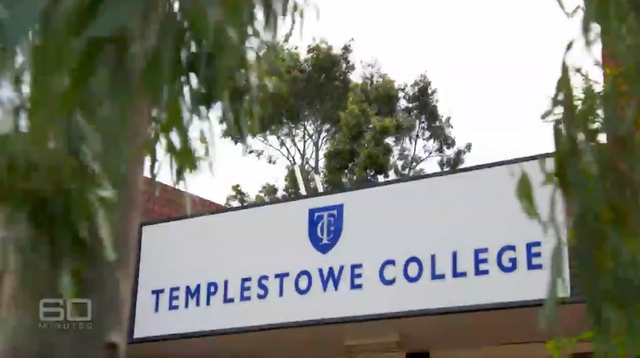
As word has spread, other schools in Australia have been sending representatives to come and learn from Templestowe College. One of the assistant principals moved all the way from Ireland to take a job with TC. She had heard about the school's innovative approach all the way from the UK.
Here are six things that make Templestowe College very different from other schools:
1. The students determine what they learn, with the support of their parents.
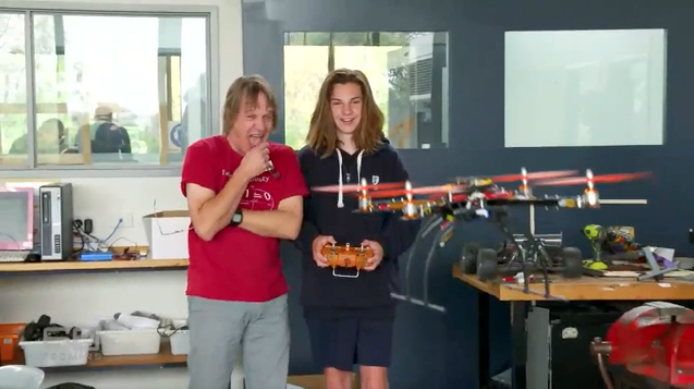
There is almost no standardised curriculum at TC.
The first year at TC, traditionally called grade 7, is called Entry Class. This first year does include some compulsory literacy, numeracy, and science classes, but beyond that, there is very little that's standard. Even in this first year, the students choose one-third of what they study from a list of twenty different electives.
After Entry Class, the students move into what's called the Flexible Learning Environment. They choose at least four electives per semester and are encouraged to try different classes to find what they enjoy learning.
Here’s a list of some the 120 electives currently being offered:
• Architecture
• Art
• Computer Gaming Design
• Computer Programming
• Dance
• Design & Technology
• Drama
• Entrepreneurship
• Fashion Textiles
• Food Studies and Catering
• Geek Studies (robotics)
• Music Performance
• Permaculture and Gardening
• Personal Fitness
• Photography
• Team Sports
• Team Management and Coaching
• Self Defence
• Farm and Outdoor Construction
• Visual Communication & Design
• Working with Animals ‐ Reptiles
• Working with Animals ‐ Feathers and Fur
• Media – Writing & Creating Content
• Languages ‐ European
• English and Humanities
• Health
• Philosophy
• Forensic Science
• How Stuff Works
• The Physics of Warfare ‐ Machines, Motion & Energy
• Freshwater and Marine Ecology
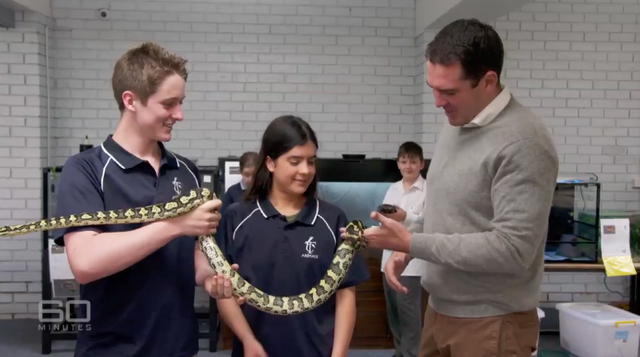
For parents looking for an even more hands-on approach to learning, Templestowe College also runs a Montessori program.
2. The answer is always “yes.”
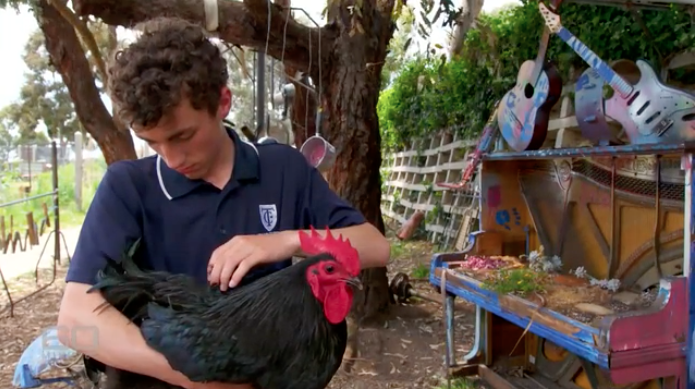
If what the student wants to study is not in the list of electives, then they can devise their own path of learning. Literally, the options are endless.
“Yes” is the default answer. If a student or parent wants something, the answer must be yes, unless it will take too much time, too much money, or it will impact negatively upon someone else.
During our family trip to Seaworld last year, my daughter fell in love with dolphins. Her new vision for her future is to move to the Gold Coast and train dolphins. TC will happily encourage her to organise her entire curriculum to that end if that’s what she decides to do.
Currently, she is in the Feathers and Fur elective and will be transitioning into Freshwater and Marine Ecology.
3. There are no bells and kids can start and end school when they choose.
Since there are no bells in real life, why have them at school? TC’s goal is for students to develop independence and take responsibility for monitoring their own time and skills development. The aim is to help the students develop into self-governing learners.
There is also an early start and a late start option. Some electives begin at 7:30 am and the kids can finish their school day at 1:30 pm. Others start at 10:30 am and end at 4:30 pm. It’s up to the student.
4. There are no year levels.
Rather than grouping students together by age, they instead group them together by interest, which is much more in line with real life. It’s common for 14-year-olds and 17-year-olds to be learning side-by-side.
5. Students design their own “home learning.” There is no “homework.”
The students must record ten hours of home learning per week, but they get to decide themselves what that will look like. It could include learning a language, learning a musical instrument, cooking a meal for the family, working on a science project or any myriad of possibilities.
6. The goal in every learning department is entrepreneurship.
The teachers at Templestowe College understand that the world will look very different in 10 and 20 years. Their conviction is that the greatest chance they can give kids to succeed is to teach them how to think like entrepreneurs, to take control of their own financial destiny.
So every teacher turns their learning department into a means for starting a business.
In the art classes, they encourage the students to display their work and sell it at local shows and markets.
One girl at the school wanted to learn how to be a barista as an elective. The only stipulation was that she had to open a coffee cart on the campus and run it as her own business. She even hires other students to help her.
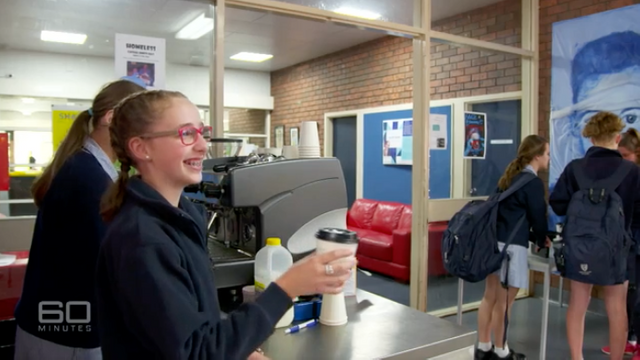
Kids in the music department are encouraged to busk on campus, to make money and add ambience to the school environment.
Every month they have a market set up on campus where the students can sell whatever they want. My daughter made cupcakes and other sweet treats with a friend to sell at the market. They each made a $75 profit from this little venture.
The guy who runs the woodworking department is particularly gifted at making guitars. So, he teaches his students how to build guitars and they sell them locally.

They often employ students to do what staff would typically do – whether that’s working in the IT department or in food service. The aim is to teach them the economic benefit of learning and work.
My son is focusing on the entrepreneurship and media electives. He’s decided he wants to start blogging on Steemit and learning more about crypto-currencies and options trading as part of his school work.
He’s also taking self-defence and music performance.
Imagine if playing the guitar, training jiu-jitsu, and building crypto-wealth on Steemit could have been your homework when you were in high school.
That's the way I wish I could have learned and I'm thankful to be able to provide that for my kids. I'll keep you posted on how they go.
Interesting, what I just read is to another extreme as oppose to what we have in Hong Kong. This sound even more free than our university students. They have choices to what subjects (within certain defined curriculum), but what's inside those subjects are still defined by the lecturers/professors.
TC sounds to me more like an business school for teenagers than a high school.
It sure will fits certain group of kids but is also "poison" to the others. I wonder if there is a mechanism to screen applications so that only students that fit are admitted.
Anyway, like to see how the graduates do after say 10years.
Hi, thanks for your comment. I think "poison" is a bit too strong of a description, although I can understand where you're coming. For some cultures, this type of approach is tough to understand.
At their school, there is also a track for those who want a more traditional education. What they do well is allow the student and parents to decide what they focus on, which is what I like most about the school.
At this stage, I'm happy for my kids to experiment and allow their interests to determine their path of study. We'll monitor closely and see what emerges. If they develop a love for learning and are equipped to add value in the marketplace, I will be happy.
But you're right. The proof will be in what they're doing a decade from now. I suspect success or failure will have more to do with parent involvement and what was modeled for them in the home, than anything else.
That is great conceptually but I do believe some kids are more suitable than some. take mine as an example, my son is more a passive learning so I need to give him more stimulus (and not too much because I dont want to be a typical chinese parents) but eventually hope to lead him to think actively about what he wants and how he wants to plan his life.
I think you're right. No one is better equipped to know how to best educate a child than his or her parents. If I could summarise the ultimate reason we have our children at this school, it's because it offers the flexibility for us to have influence in their education. Thanks for commenting.
Thanks heaps for this article we have 2 young boys and we were thinking about home schooling when they get to school age..for reasons you state about the system in this article and many others...my wife and siblings were home schooled and got guided in what they liked and they all excelled ...this concept seems really good and may be an option for us if home schooling doesn't pan out..ill be showing this article to my wife...cheers!
That would be cool but it might induce lack of discipline.
That's a fair point @funnyman and something I was concerned about. But there is plenty of accountability. It's about helping them take responsibility for their own learning.
I like that but not all of them will get it right.
It sound intriguing. My wife and I are already discussing the whole public versus private school issue for our little newborn.
I have also been musing about what the world will look like in a few years time when robots and working our farms and driving our cars and trucks. I think a different approach to education and job readiness will be needed, so entrepreneurism is a great thing to encourage in school!
Their focus on entrepreneurship is what I like the most. They also have an alternative path to uni which is cool.
I have done all of it- private, public and then Steiner education. Not sure if you have heard of it but when I was asking people about it they described it as "the fun police haven't got there yet." Basically we create constantly, have 3 lessons a day that are 2 hrs long each so students aren't expected to learn history in 20 mins by the time the roll is done and everyones settled down... its based on the head - heart- and hands theory- so we'd do some kind of mental stimulant work in the morning like maths, then middle lesson would be something from the heart like creative writing or drama classes and then the last class would be something hands on- art, jewellery making, photography, wood carvings, any kind of sport, exploring, trips to forests weekly....I loved it so so much! Definitely breaks away from traditional schooling!
Unfortunately shortly after I left the fun police did get there and the whole thing got changed up and now the high school has lost its magic. The Jnr school is still amazingly special though :) It makes me so glad to hear there is now schools like the one your kids are at emerging... I hope it works well for you all!!
Thanks @headlessjess. That's a great name by the way :)
Hopefully the fun police never show up at TC!
I hope not!! and thank you haha :)
Not sure if I agree with this. For STEM subjects you need to ensure all students have a common level of attainment before starting university. It also relies much more on having good teachers.
The system you describe sounds quite similar to steiner schools. Could also be worth some research to see if one is close to you for your kids.
This school has both a traditional track to university with an emphasis on STEM and a less traditional one where the university tracks their progress at the school for several years. Since moving to Australia, my view of the value of university has changed. I meet a lot of very wealthy, entrepreneurial people here that never went to uni. Some of them didn't even finish high school.
Thanks for posting this Jason and while it does seem like a step in the right direction I have some reservations but I will reserve judgement until I've had time to take a closer look. I must disclose that I support home schooling as the best form of education but that's just my opinion. .
My research into the education system led me to discover that education is not controlled on a state or even national level. it it controlled internationally by the Tavistock Institute and their 'ideas and programs' are then rolled-out to schools all around the world. Rockefeller and Carnegie took control of the education system in the early 1900's (including universities) and Ford joined them later. I wrote a post last year that touched on this subject Education and Indoctrination - Is There a Difference?
Norman Dodd exposed this in the 1950's when he was the Chief Investigator of the 1953 Reese Committee. He is dead now but he did this interview late in his life and it is worth listening to.
I will need to take a closer at Templestowe College when I have a little more time. It is clear to me that you love your children deeply and that you want the very best for them which you should be applauded for. Please don't take my comment negatively or as a slight on your school. I simply don't trust the education system as a rule but i remain open minded until I know more.
Thanks for commenting to share your view. I'm also a big fan of home-schooling, but after assessing our options, we felt this was the best path for our family. The school isn't perfect but we are very involved in our kids' lives and coach them along the way. We remain the biggest influence in their lives and the ones primarily shaping their world view.
That is fantastic to hear Jason. After commenting I wanted to add that if kids do go to school then the parents should be very involved in the education and ask them what they learned today etc and not outsource it to someone else and that is exactly what you are doing. They are lucky to have you as parents!
That's kind @steemtruth. Thank you.
Thanks for sharing, as a maths/physics teacher i dont see many being "interested" in learning more about Maths/Physics voluntarily in todays world. In most QLD (australia) high schools you get a handful of kids doing Physics/Maths (higher lvl). I'm not saying all future jobs need a lot of skills that you learn in these subjects but with robotics paving way of almost 50 % of jobs being lost in next 15 years we need to focus on skills such as analysis instead of lets say repetitive remebering of facts such as which date world war 2 started. I'm not saying youre kids shouldnt do something they like (such as training dolphins) but are these skills that they have acquired sought after by the market(thats transforming now) but at the same time that you obviously enjoy. This is at least what i tell my students.
That's a great point. I've heard Templestowe College actually has a very strong Physics program. Carrying on your thought, if it's left brain tasks that are the most easily automated, it seems the future will belong to the creative, the innovative and the entrepreneurial. I think I'd also but physics and cosmology in that category. Physics seems to be the last thing on my kids' minds though :)
That's why the do the Physics of Warfare! Look at the list of subjects on offer.
He said they offer all of those; last state school i was at had 1000 high schoolers of which maybe 150 were in year 12. School offered Physics but you can guess how many took it up. @rycharde
Interesting read, I personally think most government schools are more concerned about brainwashing kids, rather than teaching them. I Think with this onslaught of automation the kid who are taught to look for a career that involves some type of creativity will be the winners. So if they are teaching creativity thats great. Cheers
I agree on both points. That's why I once said I would never expose my kids to public education.